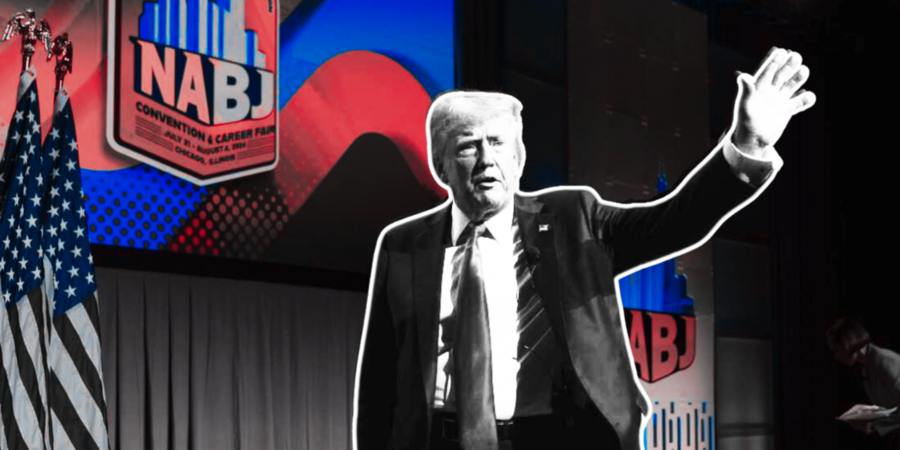
AUSTIN PETERSEN: Trump has flipped the script on Leftist race baiting
Donald Trump’s appearance at the National Association of Black Journalists was a master class in rhetorical jiu-jitsu. Trump sat stoically while weathering a confrontational introduction from ABC’s Rachel Scott, who leveled accusation after accusation at him, without so much as a hello.
But Trump is the type to bring a gun to a knife fight.
President Trump immediately began returning fire, blasting her organization (ABC) as fake news, and rightfully chastising Scott’s rude and unprofessional introduction. Scott’s introduction brought every racist accusation she could level at him
But Trump wasn’t done. “I have been the best president for the Black population since Abraham Lincoln. That is my answer.”
Trump might have some of the biggest balls on the planet to say something like that. Scott was ready with a quip praising Lyndon Johnson for his passage of the Voting Rights Act bill (the same man who is claimed to have said he’d have “n****rs voting Democrat for 200 years”).
During President Donald Trump’s tenure, the Black community experienced unprecedented economic growth and opportunity. Unemployment rates for Black Americans plummeted to historic lows, with August 2019 marking a record low of 5.4%. Trump provided more employment opportunities for Black Americans than ever before. There’s your “black jobs” for you.
Median household incomes for Black families went up, rising by 7.9% in 2019 to reach $45,438. A survey by the National Bureau of Economic Research showed a 400% increase in Black business ownership from February 2020 to April 2020.
These accomplishments highlight a period of substantial economic advancement for black Americans. His claim to being the best president for the black community since Abraham Lincoln we at Human Events have fact checked and found to be: TRUE!
Trump has been lambasted since the event for questioning Harris’ depiction of herself as black, despite having presented herself, and being presented in the media, as Indian (dot not feather). Before Don Lemon was fired from CNN even he questioned Harris’ depiction of herself and her ethnic ancestry. No one thought he was racist for it.
But the left’s double standards know no bounds.
Harris’ ancestry would be of no consequence if we lived in a merit based society. But we don’t. We live in a DEI society, and that means that if someone is going to be advanced for a position solely based on the color of their skin or their gender, as Biden did for Supreme Court Justice Ketanji Brown Jackson, then you don’t get to call people racist for confirming that you are indeed hiring a black woman for the job.
And since we live in a DEI society, where leftists are pushing for reparations for the black community based on the history of slavery in the United States… Kamala Harris would be much closer to a payer of reparations than a receiver. Notwithstanding the fact she is of black Jamaican ancestry, not African American ancestry (as Don Lemon noted), Harris ancestors were Irish slave holders, who vociferously opposed abolition. The Finegans had to have their slaves bought out by the British government to finally end the practice. Jamaica not being the United States would absolve Harris of reparations (if you tried applying logic to this nonsense).
Ben Shapiro posted a meme suggesting that Republicans should stop attacking Harris over her identity, which I absolutely reject. Let’s not forget that Trump single-handedly ended Elizabeth Warren’s campaign by calling her “Pocahontas.” Shining a light onto Kamala Harris’ race hustling does something else that’s important: It proves she has no historical claim to the grievance grift the left runs on American blacks as being historically oppressed and therefore entitled to special treatment. Harris’ family on both sides moved to the United States in the 1950s and ’60s, long after slavery had been abolished. Their journey to the United States coincided with the era of Civil Rights that others had pioneered for their families to enjoy the blessings of liberty. Thanks, Mr. Lincoln!
Much has been said of Trump’s VP pick J.D. Vance in recent days, claiming that he’s weighing down the ticket. Those arguments were laid to rest in my mind however when he was questioned by CNN about Trump’s comments at the NABJ meeting, with a pointed barb aimed at Vance’s interracial children. His response was so perfectly crafted that I won’t be surprised if we never see that clip anywhere but in the right wing media again.
Vance rebutted the anchor without a pause, attacking Kamala Harris as a chameleon. She’s everything to everybody, raised in Canada but puts on a fake Southern accent, or a “black-ccent.” Harris pretends to be someone different based on which audience she’s in front of.
Trump was right to call Harris out for her race-pandering, and conservatives shouldn’t listen to those who are suggesting we shouldn’t hold the left accountable for the glaring double standards that their woke critical theories engender. Trump’s NABJ appearance is a master class in his famous rhetorical jiu-jitsu. Kamala Harris was appointed because she was a woman of color. Justice Ketanji Brown Jackson was hired because she’s a black woman, as Biden said. We shouldn’t let fear of accusations of racism or sexism stop us from pointing out the left’s own words and using them against them. Not only because it’s cowardly, but because it does an actual disservice to minorities and women who have actually earned their positions in life through merit.
This Story originally came from humanevents.com
Stay Updated with news.freeptomaineradio.com’s Daily Newsletter
Stay informed! Subscribe to our daily newsletter to receive updates on our latest blog posts directly in your inbox. Don’t let important information get buried by big tech.
Current subscribers:








